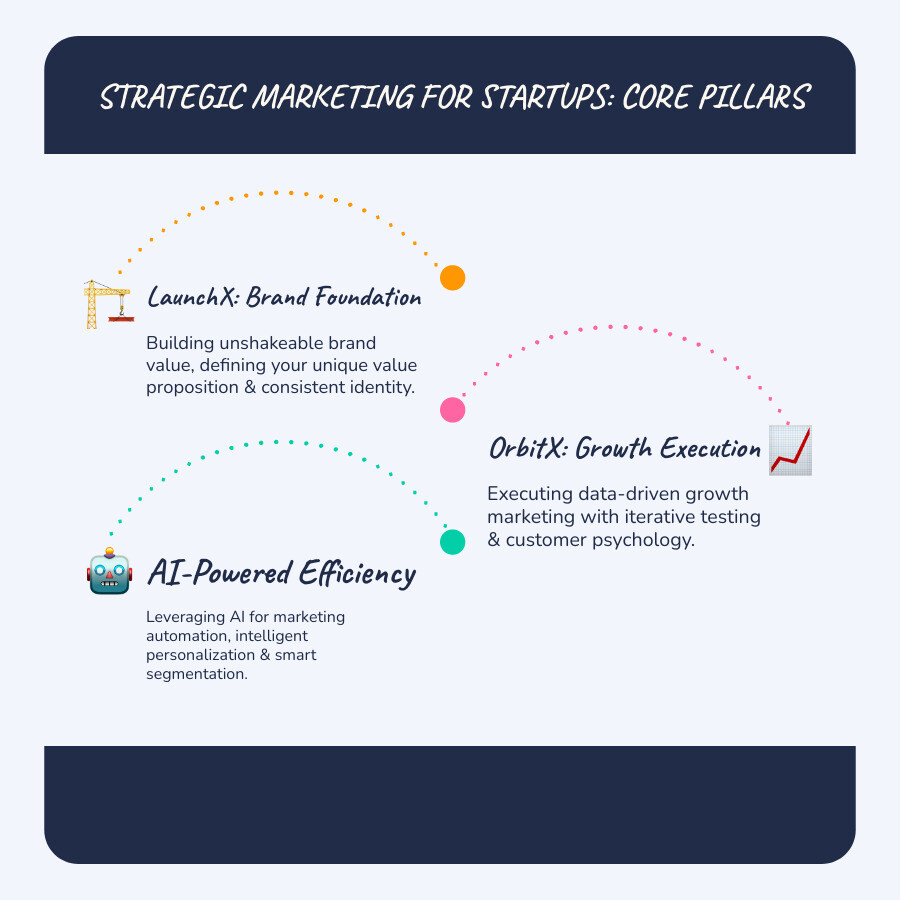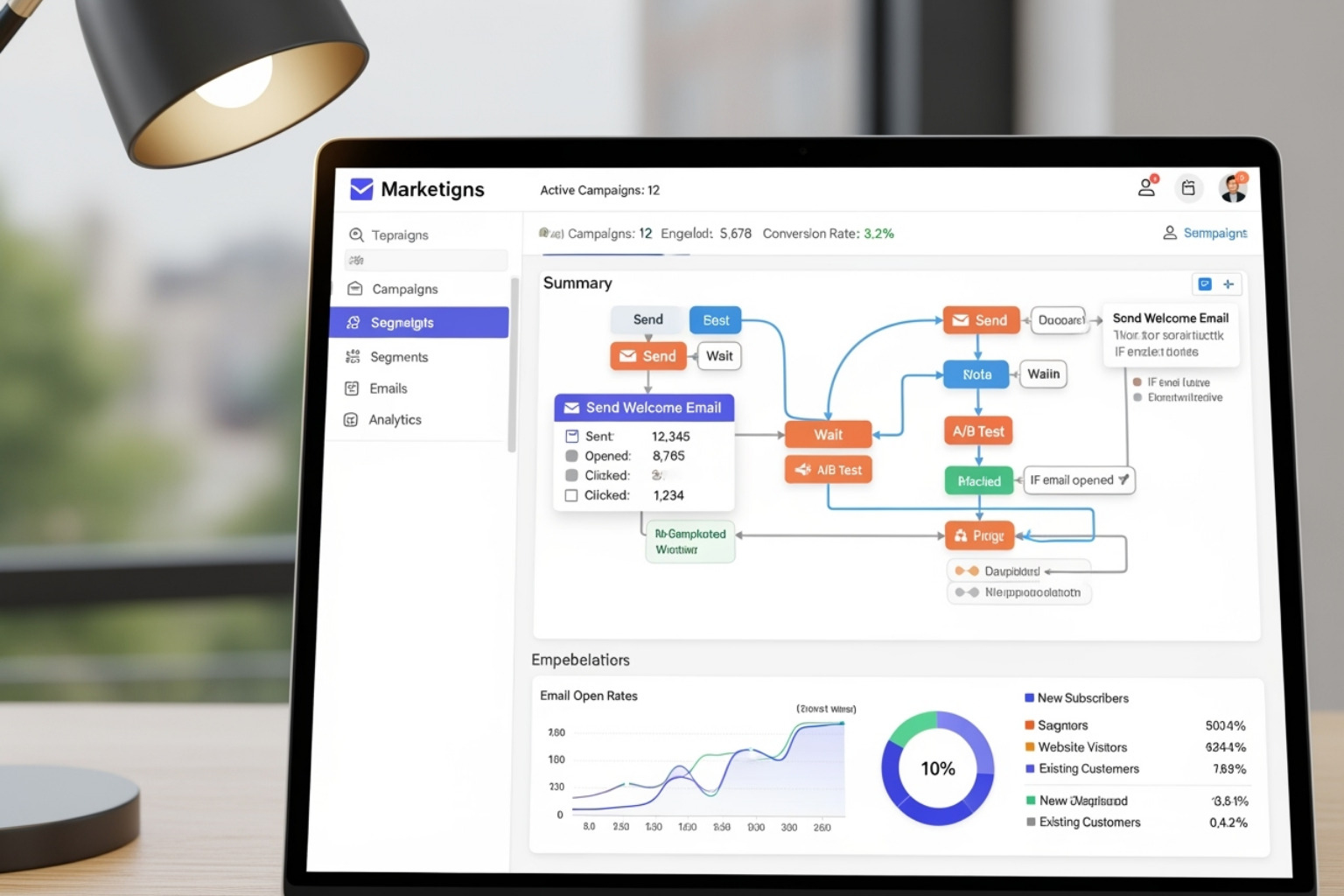From Zero to Hero: Crafting a Winning Startup Marketing Strategy
Master strategic marketing for startups. Learn to build brand value, execute growth strategies, and leverage AI for startup success.
Master strategic marketing for startups. Learn to build brand value, execute growth strategies, and leverage AI for startup success.

Strategic marketing for startups isn't optional—it's the foundation that determines whether your venture joins the 10% that survive or becomes another statistic. Here's what every founder needs to know.
Essential Components of Strategic Startup Marketing:
The numbers don't lie: 22% of startups fail because of marketing problems, while those with documented marketing plans grow 30% faster. Companies that align sales and marketing see a 27% faster path to profit.
Too many founders treat marketing as an afterthought. The reality? Successful startups build marketing into their product from day one and eventually spend more on marketing than product development once they find their groove.
Your marketing strategy needs three core pillars: building unshakeable brand value (LaunchX), executing growth marketing with psychological insights (OrbitX), and leveraging AI to maximize efficiency. Miss any one of these, and you're fighting an uphill battle.
As Tony Crisp, I've helped Fortune 500 companies and tech startups like HTC Vive, Nvidia, and Robosen develop strategic marketing for startups that drives real growth. My approach combines brand strategy with growth marketing psychology to help founders steer the complex pre-launch and scaling challenges that make or break new ventures.

Basic strategic marketing for startups glossary:
Your brand is more than a logo; it's the heart of your strategic marketing for startups. It's the foundation that makes people choose you over competitors and turns them into loyal advocates. Without it, even the best growth tactics will fail.

Building this brand power requires a clear unique value proposition, a deep understanding of your audience, and a consistent identity. Nailing this foundation makes every other marketing effort—from content to paid ads—exponentially more effective. Your messaging resonates, your visuals stand out, and customers remember you.
Before launching any campaigns, you need clarity on what makes you special and who cares. Your unique value proposition is your survival kit. It's not generic fluff; it's a specific promise, like "we help small restaurants increase takeout orders by 40% in 30 days through automated SMS campaigns."
Start with the basics: what problem do you solve, how, and why are you the best choice? This must be paired with your vision statement—not just what you do, but where you're headed. This vision guides every marketing decision.
Next is market research. Dive into who your customers really are. What are their pain points? Where do they hang out online? A solid SWOT analysis reveals internal strengths and external opportunities. This research helps you build your Ideal Customer Profile (ICP)—a detailed picture of your perfect customer, including their motivations and decision-making triggers. Understanding the competitive landscape helps you position yourself effectively.
Once you know who you are and who you're talking to, it's time to give your brand a personality. Developing your brand identity is crucial for long-term success.
Brand guidelines are your secret weapon for looking professional and trustworthy. Your logo and visual elements must be consistent everywhere. Beyond visuals, your tone of voice needs to be unmistakably you across your website, emails, and social media. Are you the friendly expert, the bold challenger, or the reliable partner? Pick one and stick to it.
Brand messaging ties it all together, reinforcing who you are in every piece of content. The goal is clarity and creating an emotional connection. The key is authenticity; people can spot a fake from a mile away. The most powerful brand storytelling comes from genuine experiences and honest conversations.
For a deeper dive, check out our guide on how to make branding strategy that drives business results. Your brand is the filter for all your marketing. Get it right, and everything else becomes more effective.
Growth marketing is the fuel for your startup's growth engine. Unlike traditional marketing, it takes a smarter, full-funnel approach, focusing on the entire customer journey from awareness to advocacy.

Growth marketing is built on experimentation and customer psychology. Instead of guessing, you test everything. Instead of treating customers like numbers, you understand what makes them tick. This approach is powerful for startups because you're not just building campaigns—you're building a system that learns and improves.
Using an agile methodology, you work in short sprints, test ideas quickly, and pivot when something isn't working. This keeps you responsive to what your market actually wants. For a deeper dive, check out our insights on Growth Marketing.
Growth marketing is perfect for startups because it helps you find what you don't know yet. Through iterative testing, you uncover which channels, messages, and tactics drive real results.
Data-driven decision making becomes your north star. Every choice should be backed by evidence, not hunches. This means setting up proper tracking from day one and letting the numbers guide your strategy.
The customer-centric approach is where psychology comes in. You need to understand not just what your customers do, but why. What motivates them? What fears hold them back? This psychological insight transforms your marketing from generic noise into personal conversations.
Channel selection becomes strategic. Instead of being everywhere, focus on finding the right audience first, then perfecting your message. Smart resource allocation is also crucial. Dedicate 5-10% of your marketing budget to exploring new channels to uncover fresh opportunities. The goal is building scalable business models that can grow with you.
If you can't measure it, you can't improve it. That's why SMART goals are your survival kit. Every marketing activity should tie back to specific, measurable objectives that matter to your bottom line.
Focus on Key Performance Indicators (KPIs) that connect directly to revenue and growth, not vanity metrics. The most important metric is Customer Lifetime Value (CLV). This single number tells you how much a customer is worth over their entire relationship with your brand. Knowing your CLV allows you to make smarter decisions about your Customer Acquisition Cost (CAC).
If your CAC is higher than your CLV, you have a problem. If your CLV is significantly higher, you have a growth machine. Retention strategies often deliver better ROI than acquisition. Upselling and cross-selling are not pushy tactics but ways to deliver more value to customers who already trust you. Combining these metrics with customer psychology allows you to create experiences that feel almost telepathic.
With your brand foundation (LaunchX) and growth principles (OrbitX) in place, it's time for tactical execution. This is where your strategy meets real customers across integrated channels.
An integrated approach means your content marketing, SEO, social media, email, paid advertising, and digital PR all work together. A customer's experience should be consistent whether they see a Google ad, read your blog, or get a welcome email. This consistency turns visitors into loyal customers.
Content marketing is a long-term investment in being found and trusted. A content-prime strategy means consistently publishing valuable content (like weekly blogs) that answers your customers' questions. This builds a library of value that works for you 24/7. Organize content into topic clusters to demonstrate expertise.
SEO is content's best friend. With most consumers using search engines to find businesses, you need to be visible. This requires keyword research, on-page SEO, and link building. Unlike paid ads, good SEO builds organic visibility that compounds over time. For technicals, see Google's SEO starter guide. For tech-specific insights, see our guide on Digital Marketing for Tech.
For social media, smart platform selection is key—be where your customers are. Focus on community building and encouraging user-generated content. When customers become your storytellers, you create powerful social proof.
Email marketing remains a high-ROI channel. Grow your list by offering genuine value. Use segmentation and personalization to have targeted conversations, and use nurture sequences to guide new subscribers and build trust.
While content/SEO builds for the long term, paid advertising offers immediate visibility. Use Google Search Ads for high-intent searches and social ads for awareness and niche targeting. The key is smart ad targeting and retargeting, backed by data and continuous optimization. Learn more about Data-Driven Ad Campaigns.
A referral marketing engine is an underrated tool that turns happy customers into advocates. Word-of-mouth is powerful, and referred customers often have higher lifetime value. Finally, digital PR and earned media build credibility that money can't buy. When all these tactics work together, you have strategic marketing for startups in action. For more ideas, see our Creative Content Marketing Strategies.
AI in strategic marketing for startups isn't about replacing human creativity—it's about supercharging it. AI acts as your most dedicated marketing assistant, amplifying both the quality and efficiency of your marketing by handling the heavy lifting of data analysis and repetitive tasks.

Marketing automation is like having a 24/7 marketing team. For lean startups, this is game-changing. Lead nurturing becomes effortless as AI handles the scheduling and personalization of email sequences. AI-powered lead scoring identifies which leads are sales-ready, allowing your team to focus on high-potential prospects.
AI for market research can summarize competitor strategies or customer feedback in minutes, uncovering insights that would take a human analyst days. It can even help brainstorm content angles based on trending topics.
No-code tools powered by AI let you test marketing concepts in hours instead of months, while chatbots can qualify leads, answer product questions, and guide prospects through your sales funnel, learning from every interaction. For more on this, see our deep dive on AI in Digital Marketing.
AI takes marketing personalization to a new level. Instead of basic demographics, AI enables psychographic clustering, grouping people by behaviors, values, and emotional triggers.
Predictive analytics can forecast which customers are likely to upgrade or the best time to send an email for maximum engagement. Real-time personalization allows your website to adapt to each visitor, showing different headlines or product recommendations based on their behavior.
AI-powered content optimization helps create message variations that resonate with different audience segments. Sophisticated data analytics tools for segmentation can identify valuable micro-segments you never knew existed. This level of insight transforms your marketing from broadcasting messages to having targeted, effective conversations with the people most likely to become your best customers.
There's no magic number, as your budget depends on your industry, growth stage, and goals. However, a key principle for strategic marketing for startups is that successful companies eventually spend more on marketing than product development. When starting, focus on high-ROI activities. A good rule of thumb is to dedicate 5-10% of your resources to exploring new channels. This prevents over-reliance on a single channel and helps you find fresh growth opportunities. The key isn't the exact dollar amount but allocating it wisely and measuring everything.
When your budget is tight, focus on these low-cost, high-impact strategies:
Starting without data is normal. Don't let it paralyze you. Every successful company started here.
A simple plan that you use and adapt is better than a perfect plan that sits on a shelf. Start with what you know, measure everything, and be ready to pivot based on what the data tells you.
A successful startup requires more than a great idea; it needs a comprehensive strategic marketing for startups approach built on three essential pillars.
First, LaunchX teaches that unshakeable brand value is your foundation. Your unique value proposition, consistent identity, and emotional connection with customers are non-negotiable.
Second, OrbitX provides the framework for executing growth marketing with psychological insights. This means embracing data-driven experimentation and an agile, iterative approach to find what works and scale it.
Third, leveraging AI in your marketing isn't a futuristic concept—it's a present-day necessity for amplifying human creativity, working smarter, and delivering better results through automation and personalization.
A documented marketing strategy is your roadmap to success. It guides customer acquisition, retention, and proves to investors you have a clear plan for growth. The most successful startups accept continuous improvement, adapting quickly based on real data, not gut feelings.
At CRISPx, we've helped tech startups steer these exact challenges using our DOSE Method™. We combine brand strategy with growth marketing psychology to help founders tackle the complex pre-launch and scaling problems that make or break new ventures.
Ready to transform your startup from zero to hero? Ready to launch your brand? Find how our strategic approach can accelerate your growth.